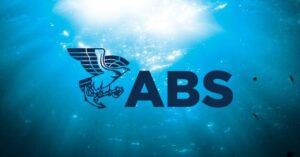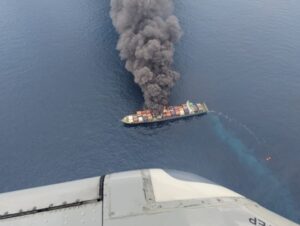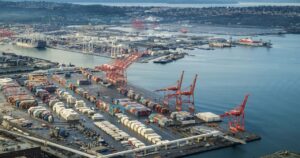A Standardised Vessel Dataset (SVD) for Noon Reports has been launched by the Smart Maritime Council following the completion of a proof-of-concept (POC) project.
The POC involved vessel operators OSM Maritime, Thome Group, and V.Ships.
These vessel operators offered a non-proprietary list of standard data points that can be freely applied by any maritime industry stakeholder to simplify data collection and analysis.
A standardised list was created by the Smart Maritime Council in collaboration with Stolt Tankers,.
The project saw Noon Report data from individual vessels operated by each of the three vessel operators mapped to the central standard and then exported as XML data files in the same common format.
The standardised data from the different companies was shared with Lloyd’s Register (LR), acting as the technology partner on the project.
This data was then uploaded into one of LR’s software platforms adapted to accept the standard format for analysis.
This eliminated the need to run a separate translation procedure for each individual operator.
With this step, the POC project was successfully completed having delivered a standardised set of data points covering common items within the Noon Report.
A noon report is a daily data sheet prepared by the ship’s chief engineer on a daily basis providing a vessel’s position. It also provides other standardised data to assess the performance of the ship based on its speed and environmental forces such as weather conditions.
The POC allowed information from three different shipping companies to be collected in a standard format and successfully imported into a software application for analysis without any further customisation.
READ: PortMiami continues digitisation of STS cranes
“Thome Group has supported this industry initiative from day one, as we believe that, along with onboard inventory control, the lack of a standardised Noon Report is one of the most consistent problem statements from our fleet colleagues and performance analysts,” said Peter Schellenberger, Vice President Supply Chain, Thome Ship Management.
“It will also free up precious time for our colleagues on board and prevent mistakes from happening.
“It is the key for better transparency in client reporting and a great chance for industry stakeholders, established supply partners, as well as start-ups, to develop added value smart solutions based on a standard data set,” Schellenberger added.
The SVD for Noon Reports has now been made available as an open list of standard data points for vessel operations for any maritime industry stakeholder to download.
The list has been initially released as a ‘beta’ version for comment and feedback from potential users outside the Smart Maritime Council membership.
READ: DP World, UAE Region and Dubai Customs to speed up digitisation
“If shipping companies can map their own data to a standard format, they can immediately share that data with any application that supports the same standard without the need for further customisation,” said Rob O’Dwyer, Chairman of the Smart Maritime Council.
“The resources wasted on customised mapping projects to translate all of the disparate data formats currently in use can then be re-invested into improving maritime analytics programmes to create additional value for users, improving vessel efficiency while also reducing the costs involved in accessing performance optimising applications.”
The initial version of the SVD for Noon Reports already incorporates a number of open international standard formats applying to the items included in the Noon Report list.
These include those used by the Digital Container Shipping Association (DCSA) in its published Just-In-Time (JIT) port call data definitions and Standards for Operational Vessel Schedules.
The Port Information Manual (PIM) produced by the International Taskforce Port Call Optimization (ITPCO) was also used as a reference.
Smart Maritime Council is a cross-industry membership group promoting data exchange amongst shipping stakeholders.








